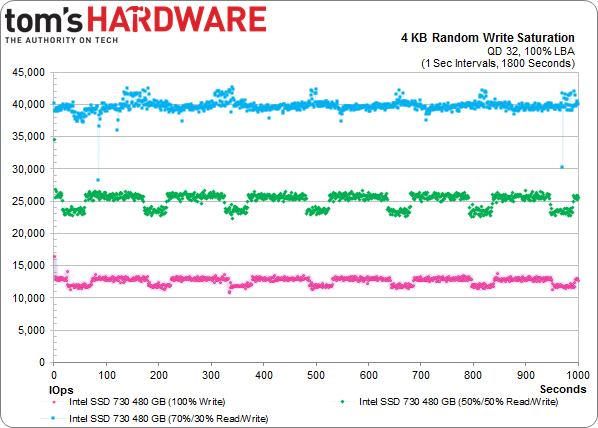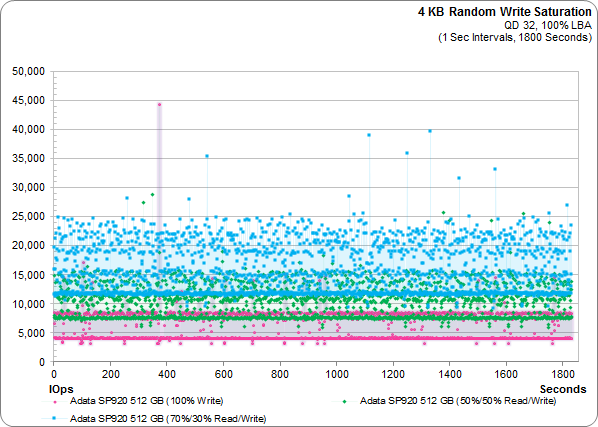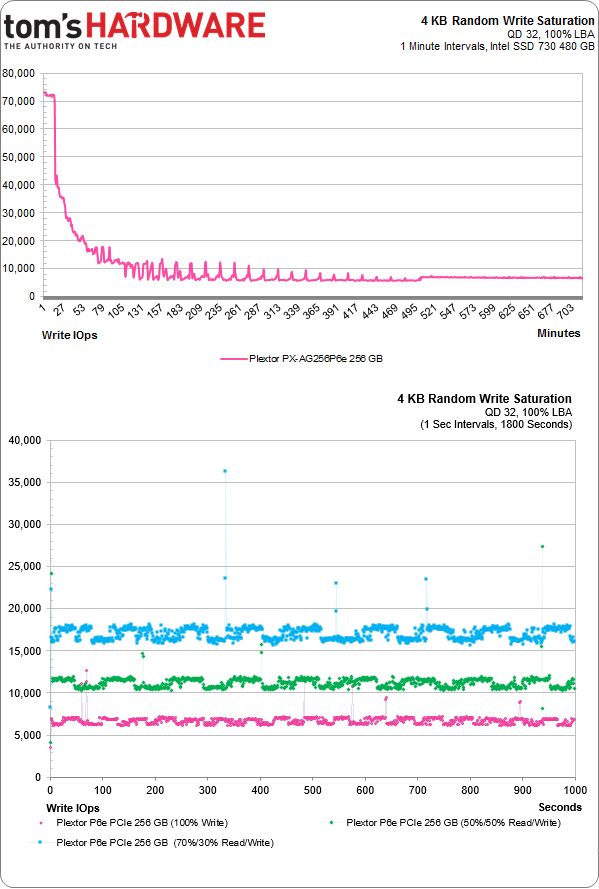Plextor M6e 256 GB PCI Express SSD Review: M.2 For Your Desktop
Plextor's next-gen M6e is a M.2 2280 PCIe SSD combined with a x4 PCIe adapter. You probably don't have a M.2 PCIe slot yet, but Plextor hopes their Marvell 9183 powered SSD will find a home in enthusiast systems thanks to their adapter.
Results: Performance Variation
Random Performance Over Time
My saturation test consists of writing to each drive for 12 hours using 4 KB blocks with 32 outstanding commands. But first I secure erase each drive. Then, I apply the write load, illustrating average IOPS for each minute (except for the last 20 minutes, where I zoom in and show you one-second average increments).
What we're doing here is taking a hard look at latency, quality of service, and consistency. Plextor continues to improve its products with an eye to the enterprise space. The M6e is decidedly enthusiast-oriented, but that doesn't mean some of the company's efforts don't trickle down into its behavior.
This chart comes from The SSD 730 Series Review: Intel Is Back With Its Own Controller. The 100% write (in pink), 50% write (in green), and 30% write (in blue) workloads are tightly grouped. There aren't any disturbing variations.
Now look at Adata's Premier Pro SP920 subjected to the same test:
The difference is significant. Each workload "band" is barely distinguishable, and there's a ton more variance from one second to the next, meaning a constant real-world application accesses I/O from the SSD inconsistently. If one operation depends on the previous one, there could be a comparatively long wait between them.
But the SP920 is representative of how most desktop SSDs behave. They typically aren't tasked with steady, demanding tasks. Conversely, in the enterprise space, predictably latency is key to building a reliable storage subsystem.
And that's why Plextor's result is so interesting. Have a look at this:
Get Tom's Hardware's best news and in-depth reviews, straight to your inbox.
In the 12-hour scale, the company's M6e starts at 72,000 IOPS or so, which is typical after a few minutes. Then as the drive is filled, the PCIe-attached SSD starts putting up a fight, periodically reclaiming dirty, invalid blocks. Eventually, it gives up and ends up in a true steady state.
Break out a second-by-second graph of the three workloads shown above, and we see that the M6e looks a lot like Intel's SSD 730. With just 7% spare capacity to utilize, Plextor's M6e can't quite hang with the 730's significant over-provisioning, which means is doesn't achieve the same rarefied performance. But the variation is minimal, limited to a few percent.
If Intel is already celebrated for delivering I/O consistently, then Plextor deserves praise as well. By limiting the M6e's performance ceiling, it keeps its floor in check, too. That's not such an apparent advantage on the desktop. However, it's a good sign that an SSD is designed hold its ground under the most grueling storage workloads.
Current page: Results: Performance Variation
Prev Page Results: Random Performance Next Page Results: Tom's Hardware Storage Bench v1.0-
dgingeri Someone needs to build an adapter that connects to a PCIe x8 slot and has mounting points for up to 4 or 8 PCIe M2 SSDs.Reply -
Au_equus lots of empty space on that PCB and its only a half height card. Maybe its possible we can see multiple TB PCIs SSDs in the consumer space or they may just restrict it to enterprise.Reply -
Amdlova 300 dollar for 256 gb... i can buy 4x 120gb v300 kingston (2200mb/s R) (1920mb/s W)Reply
raid 0. too expensive. that plextor -
menetlaus Who keeps telling you there is no demand for M.2 drives?Reply
I bought a Lenovo Y410P shortly after they were released (and was incorrectly told it had mSATA not NGFF/M.2 for the SSD), and have been waiting over a year for a decent M.2 drive to put in it. -
swordrage May be in a few years we will see an ssd connected to a PCIe x16 the and size of a graphics card.Reply -
nekromobo How much does it add to boot-time with its bios loading stuff? Other PCI-e cards add as long as a 1-2 minutes to boot time.Reply -
dgingeri It's only a single AHCI device, and it doesn't have to wait for spinup like other raid controllers, so likely only a second or so extra init time.Reply -
cryan Reply13209105 said:lots of empty space on that PCB and its only a half height card. Maybe its possible we can see multiple TB PCIs SSDs in the consumer space or they may just restrict it to enterprise.
The drive itself has no wasted space. The bridge board has plenty, being that the drive is only 22mm x 80mm.
Regards,
Christopher Ryan
-
cryan Reply13209786 said:How much does it add to boot-time with its bios loading stuff? Other PCI-e cards add as long as a 1-2 minutes to boot time.
It adds all of about a second. You'll never notice, and based on UEFI settings, you might never even see the Plextor op-rom splash screen at post.
Regards,
Christopher Ryan


